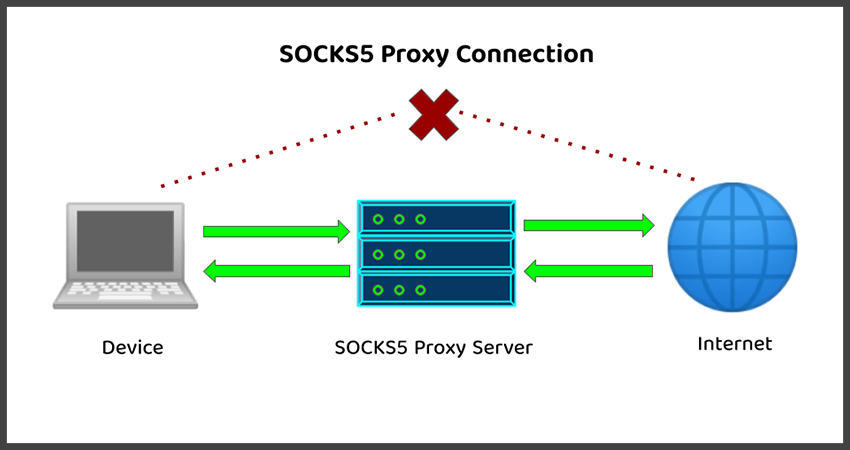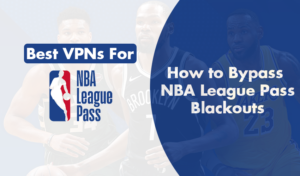SOCKS5 Proxy represents a significant upgrade in the field of online anonymity, stepping in as an added feature that numerous VPN providers have begun to offer. Its primary role is to facilitate location spoofing, which enables users to hide their IP addresses from online services.
What Exactly is a SOCKS5 Proxy?
The term ‘SOCKS’ stands for ‘Socket Secure,’ and the ‘5’ in SOCKS5 signifies the protocol version. A SOCKS5 proxy is a network protocol providing a level of security and anonymity by masking your IP address, making it seem like your internet traffic is coming from somewhere else.
This technology operates at the session layer (Layer 5) of the OSI model, acting as a bridge between the presentation layer and the transport layer. This feature sets it apart from its predecessor, SOCKS4, and allows it to support UDP and TCP protocols, in addition to the SOCKS protocol.
Authentication Methods in SOCKS5
When it comes to the SOCKS5 network protocol, there are three types of authentication methods:
- Null Authentication: No authentication needed to connect to a proxy.
- Username/Password Authentication: Login details are required to connect to a proxy.
- GSS-API Authentication: Both the user and the server use authentication methods at the operating system level to verify identity.
How Does a SOCKS5 Proxy Function?
The SOCKS5 proxy establishes a connection by directing network packets between a client and a server via the proxy server. This process is aimed at circumventing internet restrictions and accessing blocked websites or services.

Technically, SOCKS5 uses proxy servers to form User Datagram Protocol (UDP) or Transmission Control Protocol (TCP) connections through arbitrary IP addresses. For instance, if your IP is 1.1.1.1 and your traffic is routed through a SOCKS Proxy with the IP 2.2.2.2, the destination server (the website) will perceive the request as coming from the latter.
Important Note: While a SOCKS5 proxy helps hide your location, it doesn’t secure your traffic. Unlike VPNs, proxies do not encrypt your traffic, leaving it vulnerable to snooping.
Spotlight on the Benefits of SOCKS5 Proxy Servers

The advantages of using a SOCKS5 proxy are numerous and diverse:
- Circumventing online blocks
- Enhanced privacy and IP protection
- Improved Performance
- Compatibility with many applications and devices
Let’s delve deeper into some of these benefits.
Circumventing Online Blocks
Proxy servers, which serve as a bridge or intermediary between your personal device and the vast expanse of the internet, have the potential to aid in circumventing certain internet blocks. This is due to their inherent functionality and the role they play in the digital landscape.
However, it’s of paramount importance to bear in mind that a specific type of proxy server, known as a SOCKS5 proxy, won’t provide the same level of assistance when it comes to bypassing national firewalls. This is a task typically better suited to a VPN, or Virtual Private Network, which operates differently and offers a different set of capabilities.
Quicker and More Dependable Connectivity
Unlike its predecessors, SOCKS5 proxy servers utilize the UDP protocol, ensuring a reliable connection and efficient performance. The proxy server’s caching of data also speeds up the overall internet experience.
In contrast to its earlier versions, SOCKS5 proxy servers have the added advantage of utilizing the UDP protocol. This feature guarantees a dependable connection and an efficient performance, which is a significant improvement.
Moreover, the proxy server’s ability to cache data enhances the speed of the overall internet experience, making it faster and more efficient. This caching mechanism is a critical factor in accelerating the internet experience for users.
Fewer Errors and Improved Performance
Many other proxies rewrite the headers on data packets, leading to potential misrouting or mislabeling. However, SOCKS5 proxy servers do not rewrite data packet headers, reducing the chances of errors and thereby improving performance.
In contrast to a multitude of other proxy servers that manipulate the headers on data packets, which can inadvertently lead to potential misrouting or mislabeling of the data, SOCKS5 proxy servers operate differently.
They specifically avoid rewriting the headers on data packets. This particular approach significantly reduces the likelihood of errors occurring, thereby enhancing the overall performance of data transmission.
Improved Efficiency on Peer-to-Peer Networks
Owing to its ability to transfer smaller data packets, SOCKS5 offers faster download speeds. This feature makes it a popular choice for connecting to peer-to-peer sharing websites and platforms.
Due to its inherent capability to facilitate the transfer of smaller, more manageable data packets, the SOCKS5 protocol is able to offer significantly faster download speeds.
This particular characteristic of SOCKS5, coupled with its efficiency, makes it a highly favored option when it comes to establishing connections to various peer-to-peer sharing websites and platforms, where speed and reliability are of utmost importance.
Setting Up a SOCKS5 Proxy
The setup process for a SOCKS5 proxy would slightly differ based on the operating system you are using. Here are the steps for manually setting up a SOCKS5 proxy on Windows OS and macOS:
Windows OS
- Navigate to “Settings” > “Network & internet” > “Proxy.”
- Under “Manual proxy setup,” toggle the “On” button.
- Fill in details about your proxy server.
- Click “Save.”
macOS
- Go to “System preferences” > “Network” > “Advanced” > “Proxies.”
- Select the “SOCKS proxy” protocol in the menu.
- Type your proxy server address.
- Click “OK.”
The Pros and Cons of Free SOCKS5 Proxy

The internet world is rife with privacy concerns, and one solution that has emerged is the use of proxies. Among these, the SOCKS5 proxy stands out due to its versatility and adaptability. However, it’s essential to understand both its benefits and drawbacks, especially when considering a free version.
Starting with the positives, a SOCKS5 proxy is an excellent tool for bypassing internet blocks, offering a level of internet freedom that many others don’t.
As a network protocol for transferring data to a server, SOCKS5 can route all types of network traffic. Thus, it can provide faster and more reliable connections, reducing errors and improving performance on peer-to-peer platforms.
Moreover, SOCKS5 provides better anonymity by changing the user’s IP address. This feature is particularly useful for those who wish to maintain privacy while surfing the web. It’s also noteworthy that SOCKS5 offers more security and flexibility than its predecessor, SOCKS4.
However, every rose has its thorn. One of the most significant drawbacks of a free SOCKS5 proxy is the lack of encryption. This means that if you use a protocol that doesn’t use encryption, your data becomes vulnerable to intrusion.
Another point of concern is the reliability of free SOCKS5 proxies. There’s no guarantee that these free services will be consistently available or efficient. They may also present security risks, including potential exposure to malware and other online threats.
Finally, while a proxy improves your privacy, it doesn’t guarantee security. Unlike a VPN, a proxy doesn’t encrypt your data, leaving it exposed to potential breaches. Therefore, while it offers privacy by masking your IP, it falls short in protecting the transmitted data.
Expert Tip: Your best bet is a premium proxy service, which offers the best speeds, support, and security.
SOCKS5 Proxy vs. VPN: Which is Better?

A SOCKS5 Proxy and a VPN both serve to enhance online security, but they do so in different ways and with varying levels of success. A VPN creates a secure tunnel between your device and the websites you visit, offering a higher level of security by encrypting your data.
On the other hand, a SOCKS5 Proxy works by changing your virtual location and hiding your IP address from online services, thus providing improved privacy and IP protection. However, it does not encrypt traffic, making it less secure than a VPN.
In terms of speed, a VPN may cause some slowdown in your internet connection due to the encryption process. Conversely, a SOCKS5 Proxy, while not as secure, is generally faster since it doesn’t have to encrypt data.
When considering compatibility, a SOCKS5 Proxy shows an edge as it supports both UDP and TCP protocols and can be manually set up on various operating systems such as Windows and macOS.
This makes it highly compatible with many applications and devices. A VPN, while compatible with most devices, may not support all applications.
Ease of use can be subjective and may depend on the specific providers. Some VPNs are user-friendly and easy to set up, while others may have more complex interfaces. SOCKS5 proxies can require manual setup, which can be a bit daunting for non-tech-savvy users.
In conclusion, if security is your top priority, a VPN would be the better choice. For speed and compatibility, a SOCKS5 Proxy might be more suitable. However, the choice between a VPN and a SOCKS5 Proxy should ultimately depend on your specific needs and requirements.
Should You Use SOCKS5 with a VPN?
The use of SOCKS5 with a VPN offers both advantages and disadvantages. One of the primary advantages is the increased privacy. Both SOCKS5 and VPNs mask IP addresses, making it harder for online services to track user activity.
Moreover, SOCKS5 supports both UDP and TCP protocols, which provides higher compatibility with various applications and devices.
However, SOCKS5 proxies lack the encryption provided by VPNs. While this can lead to faster speeds, it also means that the data transferred is not as secure. This absence of encryption makes SOCKS5 proxies less secure than VPNs, which create a secure tunnel for data transfer, offering a higher level of security.
Stability can also be a concern when using SOCKS5 proxies. They’re known to have stability issues, which can disrupt the user experience. Moreover, the process of setting up SOCKS5 proxies manually can be time-consuming and complicated.
The decision to use SOCKS5 with a VPN should be guided by your specific needs. If speed and compatibility are your primary concerns, SOCKS5 might be a suitable choice.
However, if data security is of utmost importance, a VPN would be a better option. For users looking for a balance between speed, compatibility, and security, a VPN that offers the option to use a SOCKS5 proxy, like a SOCKS5 VPN, could be a viable solution.
In conclusion, while the use of SOCKS5 with a VPN can offer improved speed and compatibility, it does lack in terms of security and stability.
Therefore, for those users who prioritize their online data security, it is recommended to use a VPN over a SOCKS5 proxy. However, if speed and compatibility are the primary concerns, a SOCKS5 VPN could offer a balanced solution.
Remember: SOCKS is quite detectable and most likely won’t get you around national firewalls. Enhance your security with a VPN to help with this.
SOCKS5 vs. HTTP Proxy: The Key Differences

Two of the most prominent types of proxies in use today are SOCKS5 and HTTP proxies. This section will provide an in-depth comparison between these two proxies, including their functionalities, advantages, and disadvantages.
SOCKS5 Proxy: An Overview
SOCKS5 proxies are a type of network protocol that allows for the transfer of data to a server. They offer enhanced security and flexibility by routing all types of network traffic, thus providing better anonymity by changing the user’s IP address.
SOCKS5 proxies offer support for UDP connections and various authentication methods, which sets them apart from their predecessor, SOCKS4.
Their use cases include getting around internet blocks, providing faster and more reliable connections, fewer errors, and improved performance on peer-to-peer platforms. However, they come with the potential risk of exposing the user’s personal information.
HTTP Proxy: An Overview
HTTP proxies, on the other hand, are designed to handle HTTP and HTTPS requests specifically. They create a tunnel between the client and the web server, effectively hiding the client’s IP address.
This feature provides a significant security boost, especially with HTTPS proxies. However, their functionality is limited compared to SOCKS5 proxies as they cannot handle a wide range of requests beyond HTTP and HTTPS.
Comparing SOCKS5 and HTTP Proxies
In terms of functionality, SOCKS5 proxies are more versatile, handling a wider variety of requests including HTTP, HTTPS, SMTP, and FTP. On the other hand, HTTP proxies are more limited, focusing mainly on HTTP and HTTPS requests.
In terms of security, both proxies offer IP anonymity. However, HTTP proxies offer an added layer of security when dealing with HTTPS requests, while SOCKS5 proxies provide more flexibility thanks to the support for various authentication methods.
Conclusion
In conclusion, SOCKS5 Proxy has emerged as a powerful tool for online anonymity, providing an additional layer of protection over traditional VPN services.
It has revolutionized the way users interact online, ensuring a secure and private browsing experience by successfully spoofing locations and concealing IP addresses.
As more VPN providers begin to offer this feature, it’s clear that SOCKS5 Proxy is not just an upgrade but a necessity for maintaining online privacy in today’s increasingly digital era.





